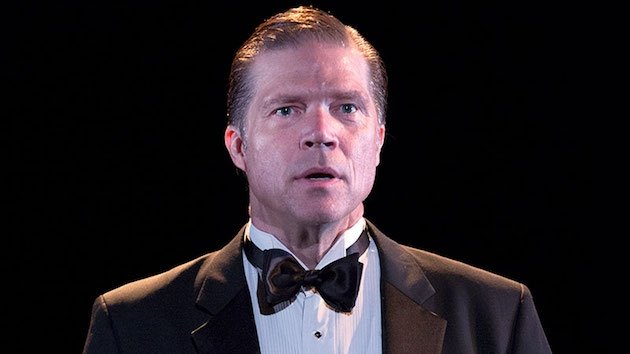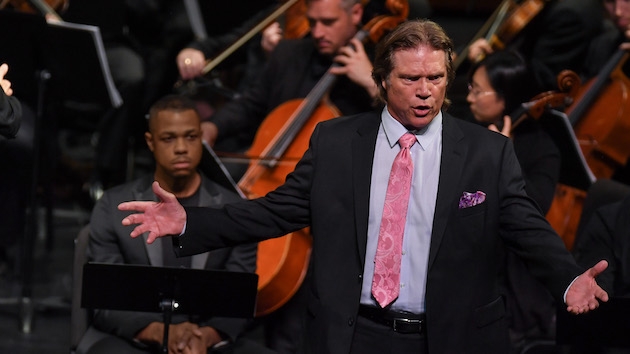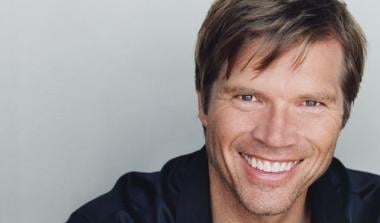
The night the curtain went up for the first time on a production by the Los Angeles Opera (Oct. 7, 1986), a young, unknown baritone named Rodney Gilfry sang the role of the Herald in Verdi’s Otello.
On Friday, Gilfry, now approaching 60, having achieved an international career in opera and musical theater, came onto the much smaller stage of the Boston Court in Pasadena to unveil an autobiographically themed cabaret show accompanied by his long-time pianist and arranger, Christopher Denny.
You might suspect that somewhere hidden away is a portrait of Gilfry that’s aging. Because on Friday, the 6-foot-3 baritone with the square-jaw Gary Cooper looks seemed as filled with youthful energy as he had been when he ambled on stage as Curly in LA Opera’s 1990 production of Oklahoma!
I interviewed Gilfry at that time. When I asked what he wanted most from his career, he said, “I don’t want to be pigeonholed!” Well, he certainly accomplished that.

In addition to standard parts at LA Opera, he premiered the role of the riverboat captain, Riolobo, in the 1997 production of Daniel Catán’s Florencia en el Amazonas and proved a top-notch Billy Budd. After a long absence he returned to the company last February for a virtuoso solo performance in David Lang’s the loser.
His Metropolitan Opera appearances include Thomas Adès’s The Exterminating Angel. He was a memorable Stanley in San Francisco Opera’s world premiere of André Previn’s A Streetcar Named Desire opposite Renée Fleming’s Blanche. He’s shot the spade out of the ace of spades as Frank Butler, soaked his hands in blood as the demon barber of Fleet Street, and seen the face of God in Olivier Messiaen’s Saint François d’Assise.
But from the moment Gilfry came onto the small stage at Boston Court, there was no artifice or onstage character to play. It was just Rod Gilfry setting the tone with Irving Berlin’s “Steppin’ Out With My Baby.”
This is Gilfry’s second cabaret show with Denny. It threads together the lyrics of 17 Broadway showtunes (and one Mexican ballad, “Bésame Mucho”) to paint a lyrical, chatty portrait of Gilfry’s life: what he’s achieved, the strain an international opera schedule put on his family, along with the simple gifts he’s learned to appreciate and be thankful for.
As this was the show’s first solo flight, it’s not surprising the flow between anecdote and lyrics sometimes felt forced and in need of polishing. And more than once Gilfry needed a bit of prompting on lyrics. It was meant to be up-close and personal, and it was. But the most important aspect of the evening was Gilfry’s ability “sell a song” using his flexible baritone that can deliver deep resonant low notes then float up to a surprisingly high pianissimo. The performance was also a family affair with Gilfry’s wife in the audience, along with their son, who was operating the soundboard.
After “Steppin’ Out,” the mood turned sentimental with “Lucky to Be Me” (from On the Town) and “My Heart is So Full of You” (from The Most Happy Fella). Gilfry turned playful with Cole Porter’s “It’s De-Lovely,” adding an abundance of new lyrics that included nods to Steven Spielberg and Taylor Swift.

He used a medley of “Ev’ry Time We Say Goodbye,” “Lonely Town,” and “In the Wee Small Hours of the Morning” to reflect on the many months his career had forced him to be away from his family. But just when the mood was approaching maudlin, he shifted gears and let the good times (and the dice) roll with an all-out rendition of Sky Masterson’s “Luck Be a Lady” from Guys and Dolls.
He pondered “The Road You Didn’t Take” (from Stephen Sondheim’s Follies), but it was Gilfry’s all-out rendition of Sondheim’s “Being Alive” (from Company) that brought down the house.
Having a chance to hear Gilfry sing in such a relaxed, semi-structured format was a real treat. The family stories might easily have turned overly sentimental, such as when Gilfry changed the lyrics of “When a Child is Born” to commemorate the birth of his fourth grandchild. But it wasn’t. It was all genuine, because that’s who Rod Gilfry is.
Correction: The youthful Rod Gilfry is nearly 60, not the 50 stated in the article as originally published.




